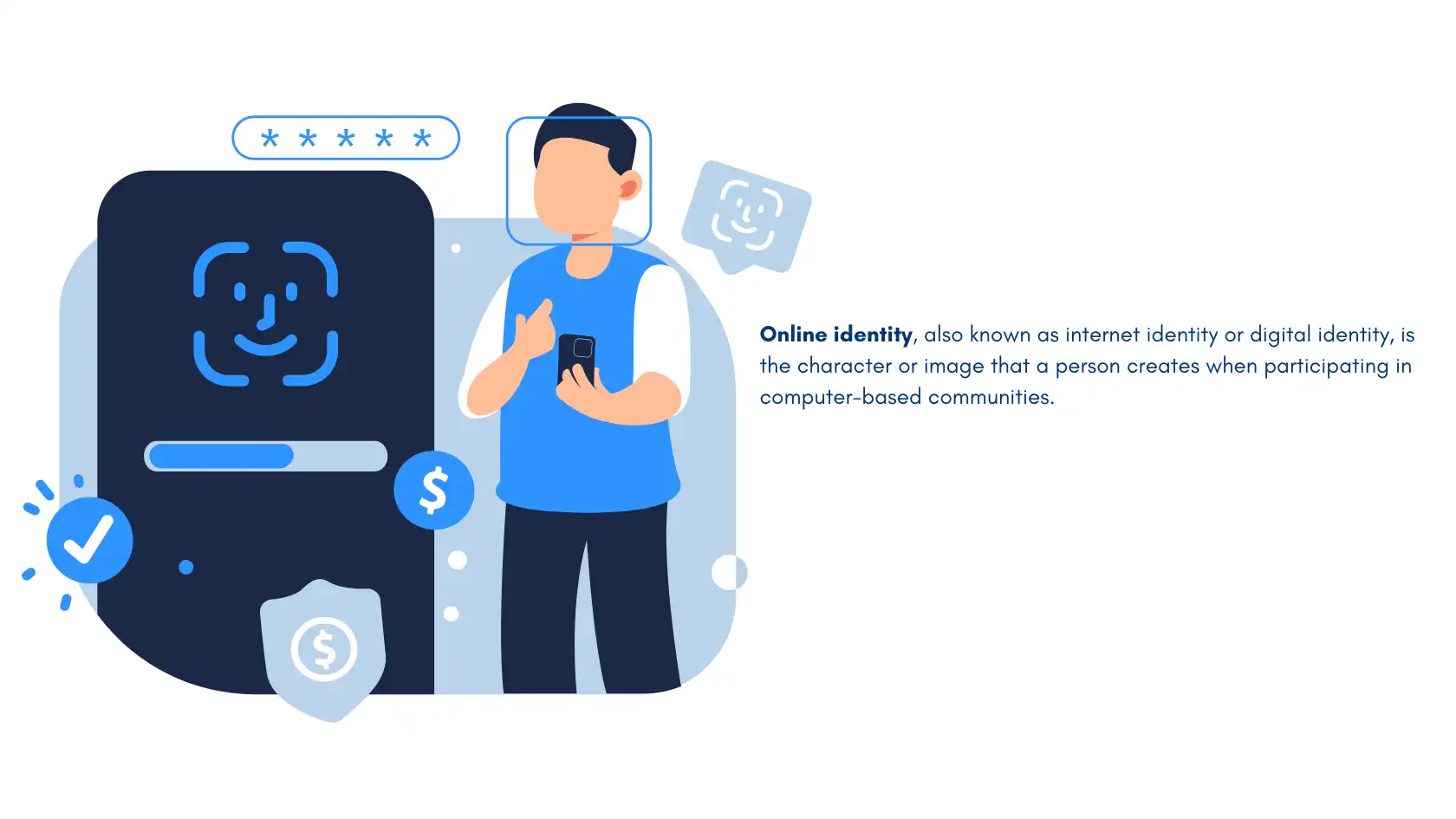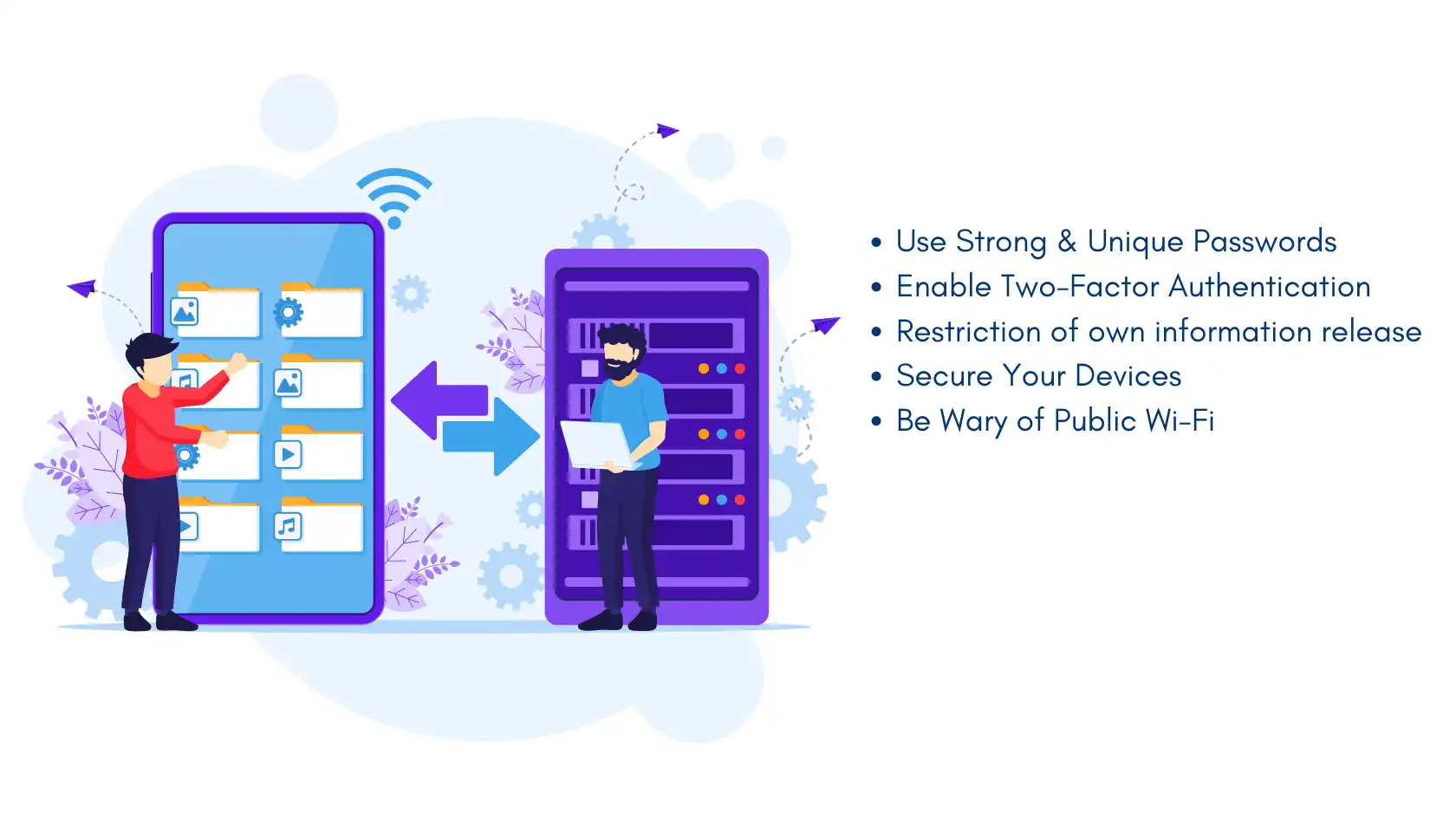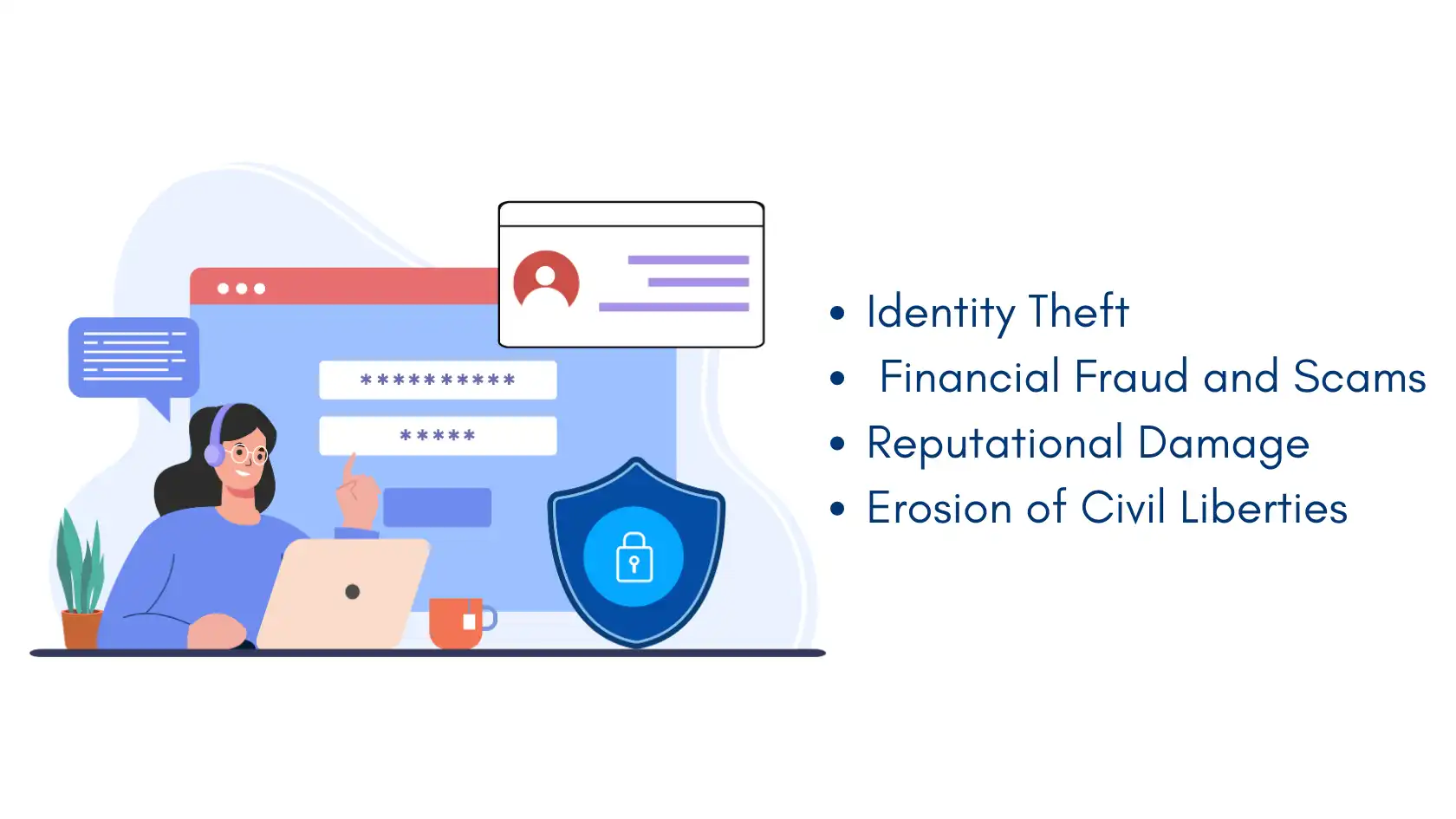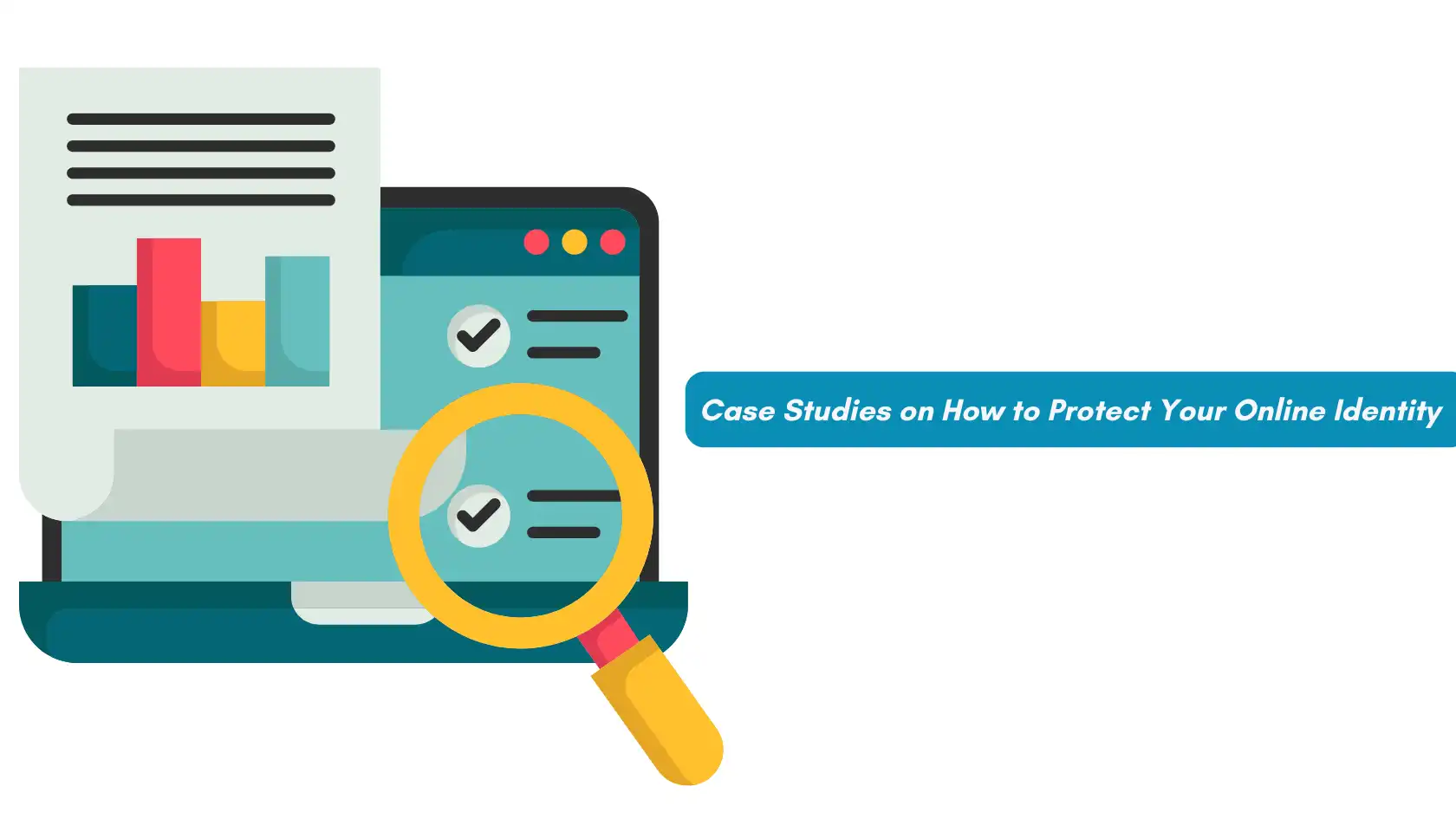At the most basic level, digital identity comprises all those things that can be connected in some way with you and your identity.
From the pictures you put in the social networks to the accounts you shop online, the emails to the phone numbers, the bank accounts, and the tax number. This is why it’s essential to protect your online identity.
Thus, your digital identity is not a single puzzle piece but dozens and dozens of puzzle pieces – accounts, ID numbers, etc. Altogether, they build up a sort of image of you.
And that’s why the little puzzle pieces that constitute your identity are so desirable for attackers. When they find the right combination of them, you get to become a victim of theft, or even fraud.
Introduction To Online Identity

Online identity, also known as internet identity or digital identity, is the character or image that a person creates when participating in computer-based communities.
It covers aspects such as usernames, profiles, and content that people broadcast from one site to another.
This was achieved in different ways in which real identities and pseudonyms can be adopted and demonstrate how users present themselves in cyberspace.
The significance of online identity in the present era of the internet revolves around interpersonal and working relationships, one’s reputation, and the services that can be availed online, highlighting the growing importance of digital identity security.
Significance of Online Identity
- Personal Branding: The idea of the avatar is also used for online identity as it contributes much to an individual’s brand and affects career and networking.
- Access to Services: It has become critical for one to maintain their online identity since many online services demand users to go through an identification process before one can be allowed to use any banking or social media accounts, make purchases online, or post content online.
- Reputation and Trust: And still, a strong and stable online presence is quite significant as users always trust the reputation associated with the Internet avatar during communications.
A Brief Look at Growing Spheres of Risk Linked to IdentityCrime Online
As more people embrace the use of digital identity, cases of identity on online platforms are also on the rise, highlighting the importance of digital identity security. Key risks include:
- Data Breaches: Large-scale losses of disks and tapes provide data that is stolen for individual identification and fraud.
- Phishing Attacks: Phishing attacks can be defined as cyber criminals luring users into applications where they can easily get the required information like passwords and social security numbers, so it’s crucial to protect yourself from these attacks.
- Social Engineering: Seducers make people provide account details by pretending to be well-known objects and this increases the vulnerability of internet identities.
- Synthetic Identity Fraud: This is because fraudsters can blend the real and fake information hence giving an impression that the account is real thus making the real account holders lose their money.
- Cross-Site Data Analysis: As much as the users hide behind aliases on these sites, one may easily get exposed, and their identity stolen or privacy invaded through the data analysis of the information provided on the sites.
With the help of focusing on the role of online identity and the potential threats connected with this phenomenon, it is possible to help individuals become aware of the main preconditions for identity theft and privacy infringement and how to prevent identity theft.

- Lightning-fast speeds to browse without lag
- Servers in 105+ countries around the globe
- Military-grade security to stay safe online
- Try it risk-free with its money-back guarantee
- Native apps for all major devices
Potential Fraud Victims Are Especially Those Who Are Less Than 60 Years
Here’s what’s happening: consumers below the age of 60 years were more likely, by twofold, to report having been defrauded while doing their online shopping.
The light also reveals that working and young adults under 60 years old lose over four times money to an investment scam, and the majority of those losses were in scams related to investments involving cryptocurrencies.
Digital identity security plays a crucial role in protecting these consumers from such fraudulent activities.
And it’s no surprise that younger adults get targeted in this regard. They are more likely than any other age group to use mobile apps to make person-to-person payments, transfer money from one account to another, deposit checks, and pay their bills.
In other words, much of this money is streaming into the palms of their hands through their phones, as well as their computers, making digital identity security even more vital.
Security against hackers and fraud implies the security of your or your digital or cyber persona. And that can feel like a pretty huge task given all the information your digital identity includes.
It can be done, although it is rather like constructing a puzzle if one considers one’s identity as a puzzle.
A piece here, another piece there, can assume the picture (or assume the picture just enough), to provide a hacker with exactly what the latter needs to shady you out of your bucks.
Again, this makes it clear that the only way to be safe is to ensure that those puzzle pieces do not fall into the possession of other people.
Best Practices For Protecting Your Online Identity

In a world where people spend most of their time on the internet, you should engage in measures to protect the image you portray on the internet.
Thanks to such threats, cyber-attacks, and identity theft, it is crucial now to establish the means for online identity protection and protect your data.
Here is more information concerning the strategies that can be useful for the effective protection of your online identity on the Internet.
Use Strong and Unique Passwords
Importance of Complex Passwords: Use of the above shortcomings, one of the first measures that should be taken to safeguard your online identity protection is always using a good password on all your accounts.
A standard password is, therefore, a combination of letters in both capitals lowercase, numbers, and special characters.
Do not use regular PINs, dates of birth, or names, and regularly used words. When your passwords are complex and different, it could be very hard for hackers to fathom how they could break into your accounts.
Recommendation to Use Password Managers: Since it is cumbersome to remember many passwords, try using that account password generator and manager. Some of you may use these tools to safely store your passwords and the tools can generate complicated passwords for you for every account.
In addition, with a password manager, you only need to come up with one master password and the tool assists in various ways to enhance strong passwords on all your accounts to prevent identity theft.
Enable Two-Factor Authentication (2FA)
Explanation of 2FA: Two-factor authentication (2FA) or 2-step verification helps in making your accounts even more secure. Besides a password, 2FA uses an additional factor like a code received by a text or email, or an app for authentication.
This means that even if you have lost your password to a hacker, what this means is that the hacker has to have the second factor to be able to get into your account, which is crucial to prevent identity theft.
Enabling 2FA is one of the ways by which the rates of unauthorized access as well as the security of one’s online persona can be greatly enhanced.
Restriction of own information release
Guidelines on What Information to Avoid Sharing: When using social media or other websites, be careful what you tell about yourself to people on the Web. Do not put up personal information at risk such as your home address, phone number, or your financial status.
Further, ensure the privacy settings to conceal your content and information from other people you are not connected with. It is much harder for cybercriminals to misuse your data if you expose as little of it as possible.
Monitor Your Online Accounts
Regularly Check Account Activity: Always check your social media accounts and other connected profiles for any signs of hacking or unusual behavior.
It means using your account and looking for logins, modifications, or transactions that are new to you.
Getting to know any occurrences in good time enables you to act quickly to protect your accounts.
Importance of Monitoring Credit Reports: Besides, there is a need to regularly check the credit reports for the existence of suspicious activities.
Every credit report you review gives you an understanding of any infringement that may be a sign of ID theft.
It may be worthwhile to use credit tracking services where you receive notifications of any changes on your credit report including accounts that have been opened on your credit report.
Secure Your Devices
Use of Antivirus Software and Firewalls: Ensure you use genuine antivirus software on your devices and ensure you use firewalls.
Some of these measures contribute to protecting the network from a malware attack, viruses as well as other unauthorized attempts to access the system.
Daily update of the antivirus checks you get the newest version of the antivirus to deal with growing threats.
Keeping Software Updated: This is important when it comes to the issue of security since new versions always contain new updates to mend any defaults that might have been exploited.
Upgrade is a procedure that is familiar to every software user and typically contains fixes for holes that cybercriminals may use.
Software that has been updated contains enhanced security features and protection hence offering the best protection to your computer.
Be Wary of Public Wi-Fi
Risks Associated with Public Wi-Fi: Using a Public Wi-Fi network puts you at risk such as data interception and man-in-the-middle-attack.
Bribery attacks can be carried out to have unauthorized access to the user’s sensitive information as the criminals create fake hotspots.
Tips for Safe Usage: As a way of increasing your security when using public Wi-Fi, always use a VPN to encrypt your connection.
Moreover, do not use public Wi-Fi to check, for example, your bank account or other matters that require high security. In case you have to submit information to restricted websites, the latter should be protected by HTTPS.
These are the best practices that you can follow to enhance the protection of your online identity and escape from the trap of identity theft or any other unauthorized access to your details.
The use of the internet in the modern world makes it important to be alert to the security of one’s identity to preserve one’s privacy.
Neglecting To Protect Your Online Privacy


Uninterrupted, high-speed browsing, zero logs so your online activity is always private.
Over 7000 people checked out NordVPN in the last month
Failure to protect your online identity and personal privacy is usually very disastrous and has effects on the people and the entire society. Here are the key outcomes of ignoring online privacy:
1. Identity Theft
Data loss may lead to identity theft, in which the criminals pretend to be you and probably cause loss of money and spoil reputation.
This is done through fake emails or hacks on different organizations’ databases which peruse their members’ details such as social security numbers and bank account details, underscoring the importance of online identity protection.
2. Financial Fraud and Scams
The lack of appropriate features to ensure privacy means personal information can easily be tapped and in the process, people lose their money through fraud.
Through identity theft, hackers gain access to engage in transactions and, in the process, embezzle money from a person’s accounts, leading to much stress.
3. Emotional Distress and Cyberbullying
Sharing personal information on social networks puts the dishes into the target of harassment and cyberbullying.
This, coupled with the fact that cybercriminals are relentless and always on the prowl, victims suffer from psychological conditions such as severe emotional distress, anxiety, and depression for failing to safeguard their data.
4. Reputational Damage
There are consequences which are associated with the reputational risks when online privacy is not considered due to it.
In the internet age, people can be slandered, and have their character assassinations being created within minutes which ripple to personal and professional lives.
Your reputation can be easily managed online if your personal information is not so protected.
5. Loss of Control Over Personal Data
Lack of privacy led to organizations and businesses using individual information without permission from the subject involved.
This can result in receiving unliked advertisements, selling data, and being unaware of how the data inserted is being utilized.
6. Legal and Financial Consequences
If an organization does not safeguard user data then it may end up facing legal consequences as well as losing a lot of money.
Data breaches mean possible legal actions, regulatory penalties, and loss of customer trust, which influence the company’s operations and P/L.
7. Erosion of Civil Liberties
Online privacy can harm civil liberties as well as freedom of expression since more surveillance is expected from administrations and brands. People might modify their behavior in cyberspace because they feel they are being observed by others.
The implications of not observing cyber security measures include loss of personal security, financial security, and deviation from social standards.
These risks should thus be guarded against, and personal information safeguarded, allowing persons to protect your online identity and stay in control of their identity online.
Case Studies On How To Protect Your Online Identity

Case Study 1: Sarah’s Strong Password Strategy
Background: Sarah, a college student, had frequently availed of different services, including social networking, banking, and educational services. After hearing her fellow female college students encounter identity theft, she felt the need for online identity protection to guard her identity on the internet.
Actions Taken:
- Strong Passwords: To this, Sarah used the password manager to first create a very hard for anyone to guess passwords for every one of the accounts that she would be having.
- Two-Factor Authentication: Some of the measures that she took included creating a couple of protective layers that included the following: she locked and protected her email as well as the banking account with 2FA.
Outcome: Due to these practices, Sarah was very careful and would minimize cases of her accounts being compromised by a third party. Indeed, when her email was in a phishing scam, the use of 2FA made the attacker unable to access her account – this is the success of protective measures she had put in place.
Case Study 2: Mark’s Caution with Public Wi-Fi
Background: Mark, a business man suffered risks when he connected documents via publicly paid WI-FI in airports and cafes. Understanding that open networks are unique points of the targeted debacle, he sought ways of shielding his persona.
Actions Taken:
- Using a VPN: Mark was very careful when it came to the connection used, especially when in a cafe using public Wi-Fi; he made sure to subscribe to a good VPN.
- Avoiding Sensitive Transactions: He discontinued the use of his account details or in any way logging into his bank statement while under the public domain.
Outcome: On one of the trips Mark found out that there is a network that is an imitation of airport Wi-Fi. Well, thanks to his VPN, he was well confident enough not to plug into that network. His awareness of having a VPN helped him avoid probable data theft and therefore he was safe when online.
Recent News Articles Related To Protecting Your Online Identity:
1. The new report reveals the sorrowful fact that identity theft has increased drastically during the Covid-19 pandemic.
According to a report from Javelin Strategy & Research disclosed at the end of 2020, new instances of identity theft had gone up by 42%. MSmokedked said that the rise was a result of the economic turmoil and the novel coronavirus COVID-19 pandemic that has enhanced cyberspace activities and thereby offered chances to the criminal menaces to manipulate weaknesses. The study underscores the importance of people bolstering the protection of their identity on social networks.
2. Apple Unveils New Privacy Features with the iOS 15
Some of the key new privacy additions in the new iOS 15 release are as follows. There is Hide My Email, used to create a random email address to use while registering for services; there is Private Relay, which ensures the traffic from the user’s device remains encrypted and untraceable. The update also has refinement on Siri so that processing the voice command will be done on the phone and not from Apple’s server, great for security purposes.
FAQs
What is online identity protection?
Why must I endeavor to protect my online identity?
What are the regular dangers for online identity?
How can I manage to develop good passwords?
What is Two Factor Authentication?
Conclusion:
It is important to make sure that you protect your online identity and keep it safe in the present-day world, where such incidents as identity theft and data leaking occur quite often.
With the help of the use of strong passwords, use of two-factor authentication, avoiding the sharing of personal details, and frequent checking of the accounts the user can further minimize the possibility of the third party accessing their important data.
When you arm yourself with the latest information about security trends and risks you will be in a position to protect yourself suitably.
As you make it your responsibility to yourself to protect your identity online you are at the same time making the environment safer for everyone else.






